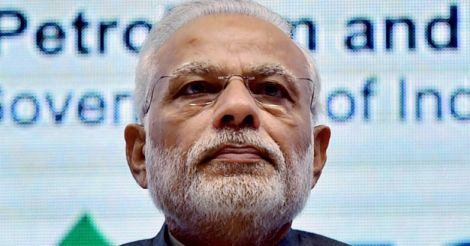It came to me as a big surprise when I saw the news flash on the Reserve Bank of India's (RBI) announcement last Monday on restrictions on deposits exceeding Rs 5,000, using the Rs 500 and Rs 1,000 currency notes. In fact, it was the 59th notification on demonetization issued by the Reserve Bank of India (RBI) since November 8. The news stunned me because when prime minister Narendra Modi announced the withdrawal of high-value currency notes, he had assured that the banks would accept the old currencies till December 30.
Anyway, without wasting time, I went to the nearest bank branch in Mumbai with my old notes. The cashier there asked me to get the mandatory form filled by providing satisfactory explanation for the delay in depositing the scrapped notes. As I had decided to write the real reason, this was the explanation I gave the bank for making the deposit: "I trusted the words of my Prime Minister and finance minister that I have time till December 30 to remit old notes. But they changed their minds."
The cashier stared up at me with a look of surprise when I returned the form. He spoke to the manager over the phone and asked me to meet him in person. The manager wanted me to cite a simple reason for the 'delay' and advised me to write that I was away or got sick hence I could not deposit the old currencies till date. I did not react. I took my mobile out and showed him a video footage of finance minister Arun Jaitely's announcement that there was no need to rush to the banks and individuals could exchange old currency bills until December 30. Realizing that I was not ready to budge, he directed the cashier to accept my application.
To be honest, I posted the copy of the form on social medias just for fun. I had no inkling that it would go viral. One of the top English dailies ran a front page story on the incident. The very next day, the RBI rolled back the controversial rule with immediate effect. The RBI's U-turn on its decision, which incidentally was the apex bank’s 60th notification on demonetization, proved that my stand was correct.
The whole exercise of demonetization is the most thoughtless reform witnessed by the country after independence. Economists and financial experts, regardless of their political affiliations, have already criticized the move terming it a mammoth tragedy. Yet the government refused to pay heed to concerns voiced by different sections and continued to cut a sorry figure before the world.
The Center has claimed that one of the reasons to demonetize notes of Rs 500 and Rs 1,000 was to curb the circulation of fake currency. But official figures show that counterfeits of these denomination account for just about 0.0002 per cent of the total currency in circulation.
Since black money in cash is only about 5-6 per cent of the black economy, the argument that demonetization would put an end to illicit wealth accumulation too holds no water. Actually, it leaves out a massive amount of black wealth converted in form of precious metals and diamonds, properties, shares and other financial instruments away from the effects of demonetization.
The Centre was hoping that out of the Rs 15.4 lakh crore that were in circulation before the demonetization, at least Rs 3-4 lakh crore would remain outside the system after the December 30 deadline. However, latest research reports estimate that at least Rs 13 lakh would return to banks.
The hope that the RBI would make windfall gains out of demonetization and transfer it to the Center has also gone. There are people who believe that demonetization can result in lower interest rates, but it looks highly unlikely because there is a possibility of customers withdrawing the deposits they made during this period. Even if they do not act in haste, the banks will be wary of such a move and will be reluctant to lend to boost their revenues so that they can cut down rates.
In the Indian economy, the interest rate is determined not by the money market, but by the RBI itself. Demonetization or no demonetization, the apex bank can easily effect a change in its monetary policy stance by cutting the benchmark lending rate.
In short, the withdrawal of high-value currency notes is a futile effort that does not sound interesting even on paper. The mindless implementation of the idea has made things worse, heaping untold misery on the ordinary people.
(The author is Dean of the School of Development Studies at the Tata Institute of Social Sciences in Mumbai. He is also a member of the Kerala State Planning Board)

























 Prime minister Narendra Modi
Prime minister Narendra Modi